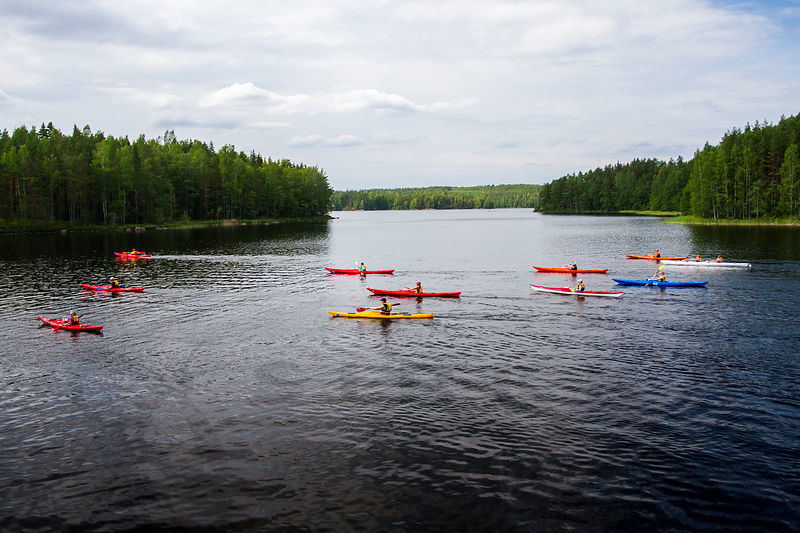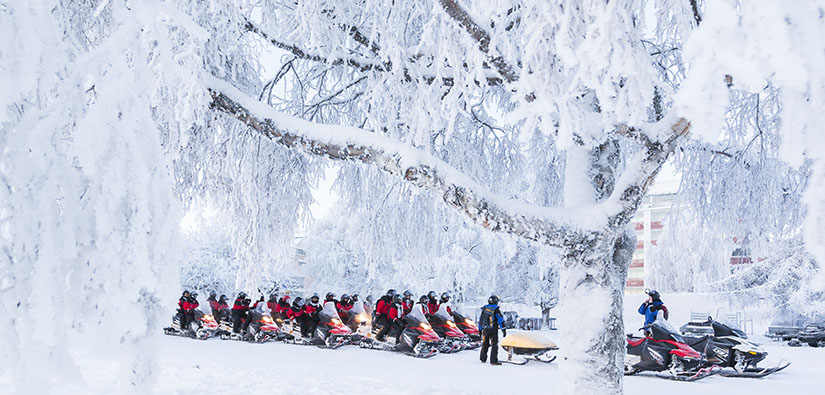Cooperation with nature tourism business
Increasing numbers of Finnish and international visitors are drawn to the attractions of Finnish nature. As visitor numbers to national parks and similar areas have gone up significantly in recent years, more tourism services are needed in these areas.

As the number of visitors goes up, more tourism services of different types are needed both at the actual destinations and in the local area, including guidance for nature excursions and wilderness activities such as fishing, equipment rentals, food, accommodation and meeting services. As a result, the economic importance of nature tourism has grown rapidly.
Metsähallitus’ Parks and Wildlife Finland unit annually analyses the total impacts on local economies of money spent by visitors to all national parks, state-owned hiking areas and a few other protected areas important for tourism in terms of revenue and employment.
Tourism companies are important customers and partners for us. We engage in long-standing cooperation with hundreds of companies around Finland. They either operate on state-owned lands and waters using hiking structures maintained by us, or communicate about nature destinations together with us. For example, Finnish Nature Centre Haltia in Nuuksio National Park has a network of partner companies which offers visitors to the national park all the services they need.
Promoting tourism, supporting local economies, enabling entrepreneurship and ensuring that nature tourism is sustainable are essential goals for Metsähallitus.
Carefully planned cooperation
When a company uses state-owned lands or hiking structures maintained by Metsähallitus in its business activities, it usually has to sign an agreement on cooperation or rights of use with Metsähallitus (for more detailed instructions, see below). The possibilities of using an area depend on its type: in a nature reserve, for example, tourism activities are more restricted, whereas less stringent rules apply in multiple-use forests.
Addressing environmental issues is crucial in tourism business. By regulating these activities, every effort is made to minimise environmental loading.
In their cooperation agreements with Parks and Wildlife Finland, nature tourism companies undertake to comply with Metsähallitus’ principles of sustainable tourism. Metsähallitus carries out sustainability monitoring at the most popular nature destinations to ensure that recreational use does not put their ecological and cultural values at risk.
We regularly collect feedback from our partner companies. Feedback questionnaires and development discussions provide information on how the cooperation has worked and which aspects of it should be improved. The questionnaire used by Parks and Wildlife Finland also collects information about how the principles of sustainable tourism have been realised in companies’ activities.
Stepping stones to cooperation
If you are interested in operating as a tourism business on state-owned land or concluding a cooperation agreement with Metsähallitus for other reasons, fill in the contact form and tell us about your idea. You will be directed to the right person.
Which kind of tourism service are you interested in?
Click the links for further information.
- Providing tourism services in multiple-use forests.
- Providing tourism services in national parks or other protected areas.
- Providing tourism services related to fishing or hunting.
- Building or leasing properties for tourism services.
Tourism services in multiple-use forests
Metsähallitus’ multiple-use forests are usually highly suitable for tourism activities. Forestry Ltd has flexible agreement practices and is open to negotiation.

Activities that are prohibited in protected areas are possible in multiple-use forests, such as making new tracks for off-road traffic, or putting up new rest stops exactly where the company needs them.
State-owned hiking areas and recreation forests are in multiple use. Hiking areas provide diverse possibilities and structures for hiking and other recreational uses of nature. In hiking areas, the needs of recreational use are accounted for in forestry operations. Recreation forests, on the other hand, are commercial forestry areas primarily reserved for recreational use, often with particular landscape values. Every care is taken in their management to preserve features that facilitate recreational use.
In Finland, being out and about in nature is allowed on the property of all landowners under public access rights (‘everyman’s rights’).
Anyhow, when commercial nature tourism activities with an impact on the forest environment are conducted in Metsähallitus’ multiple-use forests, an agreement must be concluded with Forestry Ltd. This means that Metsähallitus is informed of the activities, they are safe, and they can be taken into consideration as agreed, for example in forest management.
Off-road traffic
You should remember that the landowner’s permission is always needed for off-roading with motor vehicles. Nature tourism companies can also conclude agreements on different types of trails (for reindeer sledding, husky sledding, snowmobiling, mountain biking, motocross and off-roading) as well as bases or structures (lean-to shelters, huts, landing sites, climbing and obstacle courses, reindeer fences).
In these cases, an agreement on rights of use will be made. The costs involved will depend on the length and location of the trail. Preferably, companies should use existing trails. To set up bases and structures, an agreement on rights of use must be signed. The fees charged under these agreements are determined on a case-by-case basis.
Tourism cooperation in protected areas
Metsähallitus, Parks & Wildlife Finland maintains basic services in nature reserves and hiking areas on state-owned lands and waters. While these services are free for private customers, companies are charged a fee based on customer numbers for their use.
The primary objective of this cooperation is to ensure sustainable tourism and preserve the ecological and cultural values of the area. It also aims for increasing the recognisability and attraction of both the partner companies and the protected areas. Other goals include promoting product development and communications and serving the common customers as well as possible.
Fishing and hunting permits, also for companies
If a company intends to provide tourism services associated with fishing or hunting, Parks & Wildlife Finland should be contacted about permit matters. Customers of companies have access to hunting and fishing destinations on state-owned land on the same principles as private customers.
Hunting and fishing permits are issued and sold as public administration decisions in compliance with such statutes as the Fishing Act, the Hunting Act and the Administrative Procedure Act. These Acts do not make any provision for separate agreement practices for companies. This means that if an entrepreneur needs for example hunting permits for their customers, they buy these permits online or using the telephone service in the same way as private customers. In some hunting areas, challenges arise when the demand for permits exceeds the regular offer. On the other hand, in many areas permits are easier to obtain.
Nature reserves, hiking areas and multiple-use forests alike offer many destinations where fishing tourism services can be provided, in particular: the areas are equipped with rest stops and other hiking structures. A company wishing to use these structures should sign an agreement with Parks & Wildlife Finland.
Lease of fishing waters
Wildlife Service Finland is sub unit of Parks & Wildlife Finland. In some cases it can lease water areas to a company, which can then be used for such purposes as fishing tourism. Wildlife Service Finland has also sought new areas for fishing tourism companies in its project titled Go big on Northern fishing waters.
The project revealed that companies urgently need continuity and predictability in their operating environment. Wildlife Service Finland works to reduce companies’ business risks, for example through fishing arrangements and fisheries management. Koutusjärvi Lake in Pello is an example of a destination developed with commercial fishing tourism in mind, in which sustainable fishery management is ensured by regulation measures. Entrepreneurs have been involved in developing the site to ensure that the destination and its operating model would meet their needs optimally.
Contact persons of Wildlife Service Finland
Ahti Putaala
Puh. +358408272574
Property Development serves customers wishing to purchase or lease properties
If a tourism company is interested in buying or leasing Metsähallitus’ land or building new hiking structures and properties, their partner in Metsähallitus is Property Development.
Property Development has many sites suitable for tourism activities for sale and lease. These sites can be browsed on the Laatumaa.fi web service.
However, not all sites suitable for commercial nature tourism are advertised online, and Property Development will be happy to find a site suitable for a customer’s business, or to customise an existing site if necessary. This may mean modifying a valid plan. Plan changes are negotiated with the relevant municipality or the city, and authorities, neighbours and other stakeholders are also consulted about changes following the usual procedure.
Sites for tourism business were previously only developed in zoned areas, which could include areas covered by a local master plan prepared by the municipality or the city, or a detailed shore plan or local detailed plan produced by Metsähallitus. As tourism activities have picked up, sites have also been sought outside areas covered by these plans, motivated by Metsähallitus’ task of promoting regional livelihoods and tourism business. The agreements are concluded for 40 years in zoned areas and 5 to 15 years in other areas.
Metsähallitus also has a number of existing properties that can be used for nature tourism activities. They include visitor centres, camping areas and many types of wilderness huts. Metsähallitus puts the management and lease agreements related to these properties out to tender at regular intervals.